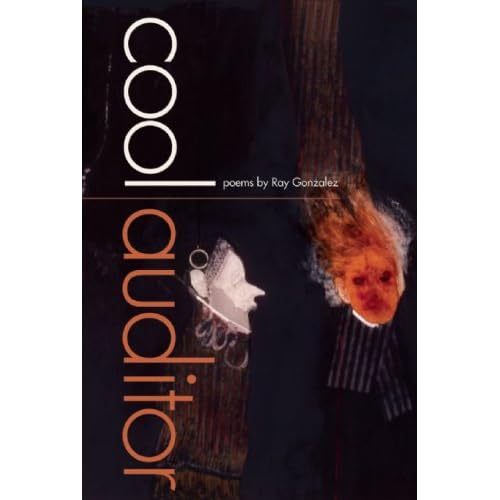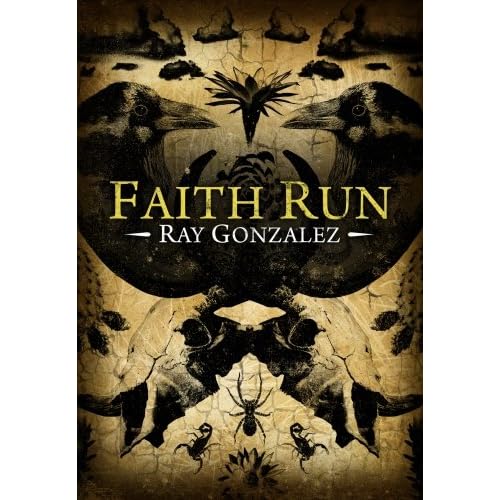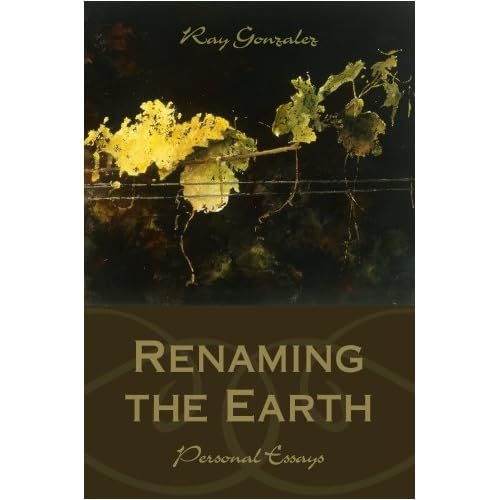El Paso Writer Spotlight: Ray González
Writer's El Paso Roots Provide Creative Abundance
Ray González is one of the most prolific writers in Chicano(a) Literature. Poet, essayist, educator, González has led nonprofits, taught writing to juvenile offenders, and taught in public schools and at universities.
Born and raised in El Paso, Texas, he attended the University of Texas at El Paso and received his MFA from Southwest Texas State University.
Critics have said González fills his poetry with Southwest, desert, and indigenous motifs and imagery.However, Gonzalez is not limited to poetry, he also works as a serious editor and essayist.
El Paso Exodus, Denver, San Anto and more
After leaving El Paso, González moved to Denver where he got involved with the writing community there. He taught writing classes for the Emerson House Detention Center, served as editor for La Voz, and began working with Denver's Bloomsbury Review. He was director of the Guadalupe Cultural Arts Center in San Antonio. He served as poetry editor for Denver's Bloombury Review even while away from Denver and was even active in the publication into the 1990s. Before going to Minnesota, he taught at the University of Illinois in Chicago.
Publications
His first publication, From the Restless Root (Arte Publico Press) came out in 1986. González has edited twelve books including After Aztlan: Latino Poets of the Nineties (Boston), Mirrors Beneath the Earth: Short Fictions by Chicano Writers (Curbstone), Touching the Fire: Fifteen Poets of Today's Latino Renaissance (Anchor), among others. González is the author of nine book of poetry and several books of essays and prose.
Awards
González is said to have a very good understanding of the publishing industry, both on a “technical and promotional basis.” He created his own press called Mesilla which published works of many Denver poets. While in Colorado, he was awarded the Colorado Governors Award for Excellence in the Arts (1988). He is also the recipient of the 2003 Minnesota Literary Award for Poetry and the PEN Oakland/Josephine Miles Book Award. In 2003, he also received the Lifetime Achievement Award for Literature, Border Regional Library Association, February 2003. For more awards, click HERE. He is the founding editor of the journal Luna.
Among his influences are Pablo Neruda and Robert Bly. Also of note, is that University of Arizona Press's Camino del Sol Series originally began under his auspices.
González currently teaches at the University of Minnesota.
Recent book by Ray González
(American Poets Continuum) Paperback
BOA Editions Ltd.; 1st edition (November 1, 2009)
ISBN-10: 1934414298
Fusing the real with the surreal and the natural world with human relationships, Ray González creates his own brand of magical realism. Gonzalez also brings pop humor in such poems as “The Guitars,” which uses the word “guitar” in almost every sentence to talk about the true (and not so true) lives of rock stars. David Lazar notes, “Ray González may be our most essential prose poet.”
(Camino Del Sol a Latina and Latino Literary Series)
Paperback - University of Arizona Press (September 1, 2009)
ISBN-10: 0816527695
Faith Run offers the most recent work by the well-known poet Ray González. The poetry here is — at once — perhaps his most personal and most universal. At the heart of these lyrical, sometimes ethereal, poems is a deep sense of the mystery and even the divinity of our human lives.
Although Gonzalez invokes the names of many poets who have come before him, including Walt Whitman, Pablo Neruda, Robert Frost, Charles Wright, Allen Ginsberg, and Federico García Lorca, he writes in his own singular voice, one sculpted by the scorched and windblown landscapes of the American Southwest, by the complications of life in a borderland, by the voices of ancestors.
With the confident touch of a master craftsman, he creates a new world out of the world we think we know. In his poems, the personal suddenly becomes the cosmic, the mundane unexpectedly becomes the sublime.
For González, it seems, we humans can transcend the ordinary — just as these poems transcend genre and create a poetic realm of their own — but we never actually leave behind our rooted, earthbound lives.
For González, it seems, we humans can transcend the ordinary — just as these poems transcend genre and create a poetic realm of their own — but we never actually leave behind our rooted, earthbound lives.
Although our landscape may be invisible to us, we never escape its powerful magnetism. Nor do we ever abandon our ancestors. No matter how fast or far we run, we can never outrun them. Like gravity, their influence is inexorable.
These poems enchant with their language, which often leaps unexpectedly from worldly to otherworldly in the same stanza, but they cling and linger in our memories — not unlike the voices of friends and relatives.
These poems enchant with their language, which often leaps unexpectedly from worldly to otherworldly in the same stanza, but they cling and linger in our memories — not unlike the voices of friends and relatives.
(Camino Del Sol Series)
Paperback University of Arizona Press (October 15, 2008)
ISBN-10: 0816524076
In his distinctive and spirited way, Ray González, the well-known essayist, poet, fiction writer, and anthologist, reflects on the American Southwest — where he was raised and to which he still feels attached (even though he has lived much of his life elsewhere).
González quite as hard as in his native city of El Paso, Texas.
There he finds the “segregated little town of my childhood” transformed into “a metropolis of fast Latino zip codes . . . a world where the cell phone, the quick beer, the rented apartment, and the low-paying job say you can be young and happy on the border.”
Readers will wonder, along with the author, whether life along the “new border” is worth “the extermination of the old boundaries.”
But there is another side of the Southwest for this “son of the desert” — the world of dusty canyons, ponderosa pines, ocotillo, and mesquite. Here, he writes, “there is a shadow, and it is called ancient home — structures erased from their seed to grow elsewhere, vultured strings searching for a frame that stands atop history and renames the ground.”
Rooted in the desert sand and in the banks of the Rio Grande, the muddy river that forms the border between nations, these essays are by turns lyrical, mournful, warm to the ways of the land, and lukewarm to the ways of man.









No comments:
Post a Comment